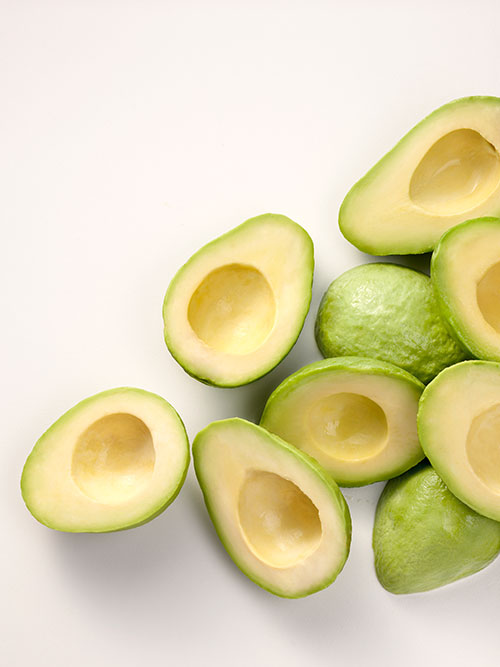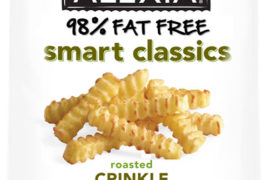An abundance of fresh-frozen vegetables and fruits from Ardooie, Belgium-based Ardo NV will be showcased at the company’s stand (E 011 in Hall 4.2) during the Anuga food fair in Cologne, Germany, Oct. 5-9. Among newly launched items to see and sample are Vegetable Fries, Italian Herb Mix, Avocado Halves, Cherry Tomatoes and Ovendried tomatoes.
 Ardo’s Italian Herb Mix features red onion, parsley, basil, garlic scrapes, thyme and oregano. Distribution is in 1 kg packages, as are the newly rolled out Avocado Halves. Available in multiple forms (diced, strips, pureed, etc.), the avocado product is versatile as an ingredient in wraps, sandwiches, salads and other dishes.
Ardo’s Italian Herb Mix features red onion, parsley, basil, garlic scrapes, thyme and oregano. Distribution is in 1 kg packages, as are the newly rolled out Avocado Halves. Available in multiple forms (diced, strips, pureed, etc.), the avocado product is versatile as an ingredient in wraps, sandwiches, salads and other dishes.
Cherry Tomatoes, positioned as ideal for use as a tasty, colorful component in salads, sauces and pizza, serve up with consistent quality. Distribution is in 2.5 kg packs. The Ovendried Tomatoes offering, meanwhile, comes in 1 kg packs. Menu options include presentation as an aperitif, while creative chefs will use them in sauces and mixes.
Vegetable Fries further expand Ardo’s Les Tapas range. The crunchy, lightly batter-coated product is a blend of carrot and parsnip strips pre-fried in sunflower oil. Promoted as an “alternative to traditional potato fries,” the chips are ovenable as well as ready for traditional deep-frying.
Additionally, Tagliatelle and Rigatoni Pasta are being highlighted in the company’s Express range of pre-cooked, blanched, pre-roasted or grilled products. And there will be plenty more value-added items in store for buyers at Anuga, ranging from Mango Fruit Puree and Red Rhubarb to Insalata Mediterranea, Risotto, Vegetable Burgers, Broccoli Mix and Onion Rings.
Ongoing Investment Projects
A continuous commitment to investment plays an important part in keeping new products rolling out to consumers without interruption. Such investment is evident in a completely new production line dedicated to leek and celery crops now being installed at Ardo’s flagship factory in Ardooie. Elsewhere in the company’s pan-Europe network of manufacturing sites, two new lines are coming on stream at the plant in Saint-Sever, France, for foil packing in units weighing up to 2.5 kg, as well as in large packaging containing up to 10 kg in bags or cardboard.
On the sustainable storage and distribution front, work has started on a fully automated palletized coldstore in Geer, Belgium. Plans have been approved for construction of a similar facility at the Ardo production facility in Zundert, Holland.
Raw Material Situation
In mid-September, following harvest delays of ten days to three weeks for many key crops in Europe due to weather-related delays in the growing season, Ardo issued the follow market and harvest report:
The results for garden peas were quite varied, from very low (Portugal, -50%) to average (Spain and France) and normal (northern Europe). As a result of the low stock position just before the crop came in, larger quantities were exported worldwide immediately following the harvest. Overall, no surpluses are expected.
Green beans, which were sown considerably later than usual in 2013, seem to be growing as planned. Harvest results will depend on the weather conditions during September and October, since even mild overnight frost can damage or even destroy the plants.
A normal growth and harvest situation was reported for baby carrots. The leek situation, however, is much more worrying. Stocks in Europe are essentially empty. The long winter period did not allow
for a spring harvest, so large quantities had to be harvested late in the cycle, resulting in reduced yields.
All courgettes were harvested with normal yields. Other Mediterranean vegetables, such as aubergines, tomatoes (including cherry tomatoes) and peppers yielded normal harvest results.
Broccoli, on the other hand, is not achieving the desired yields at all locations. In Portugal, persistent rain over the spring devastated a number of fields, resulting in harvests that were reduced by as
much as 40%. Fields for autumn and winter broccoli, meanwhile, have been contracted.
The yields for corn are expected to be as much as 20% lower than normal.
For winter vegetable crops such as black salsify and Brussels sprouts, it is still too early to make harvest predictions. What is certain is that for both vegetables (particularly Brussels sprouts) the stocks from 2012 are practically empty.
In general, the 2013 harvesting year can be described as erratic with very varied yields — sometimes even within a single growing area. However, this year there has seen a clear increase in sales to
new global markets. This is positive in terms of cultivation and consumption of fresh-frozen vegetables produced in Europe.
Adro pointed out that the frozen food industry’s further processors, as well as retail and foodservice buyers, must take into account the significant increase in raw material prices, which are now translating into increased sales prices for the new harvest.




